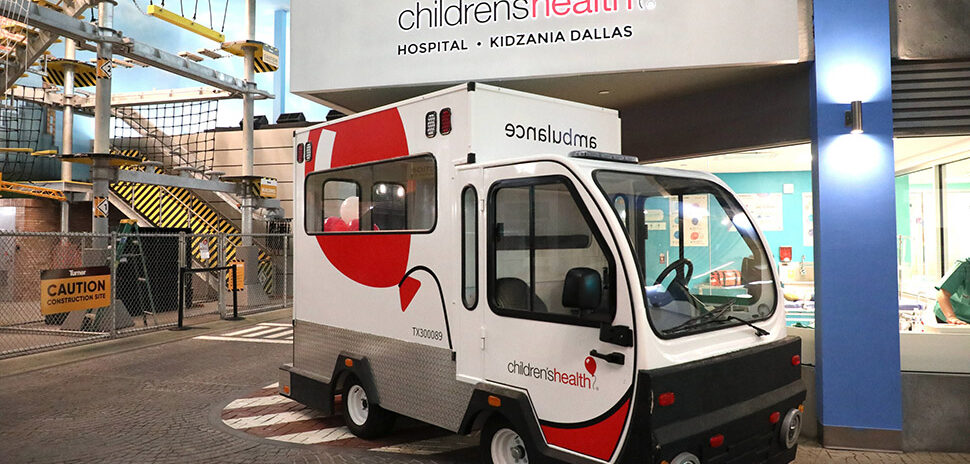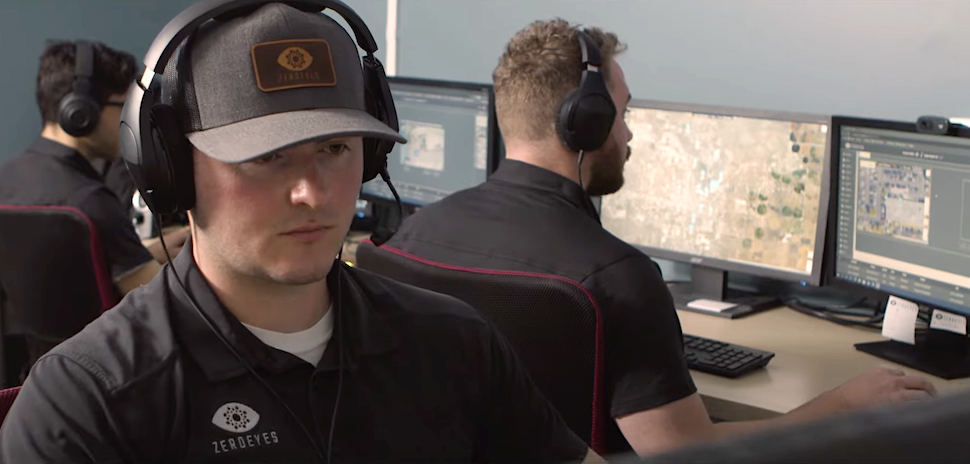“We’re proud to support Orbis and its programs that tackle avoidable vision loss by building strong and sustainable eye care systems worldwide.”
Charles Herget
President
Alcon Cares
.…on the Alcon Foundation’s support of Orbis International’s Flying Eye Hospital mission to Mongolia.
![]()
Supported by Fort Worth-based Alcon Foundation, FedEx, and OMEGA, global eye-care nonprofit Orbis International is conducting a three-week training project in Mongolia on board the Orbis Flying Eye Hospital—the world’s only fully accredited ophthalmic teaching hospital on a plane.
The training runs through August 22 and aims to build the skills of local eye care teams, strengthen the ability of partner hospitals to deliver care, and raise awareness about eye health in Mongolia, Alcon said.
“Alcon sees a world where treatable, preventable conditions that affect individuals’ eye health receive the attention they need, when they need it, regardless of geography, gender, age or socioeconomic status,” Charles Herget, president of Alcon Cares, said in a statement. “We know that the only way to make quality eye care more available and accessible is by cultivating self-sustaining eye health ecosystems and developing well-trained eye care teams.”
Dallas Innovates profiled Orbis’ first-of-its-kind airplane hospital and staff in 2016.
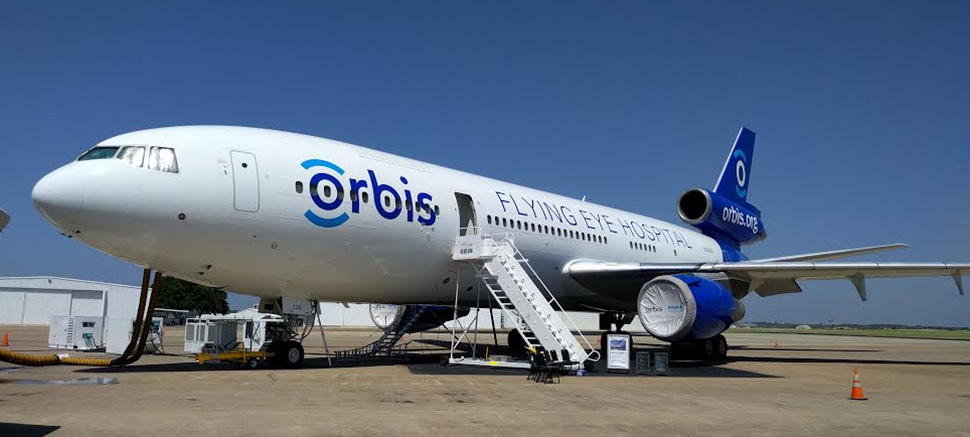
The Flying Eye Hospital parked at Fort Worth Meacham International Airport. (Photo Courtesy Orbis)
Alcon said that this project marks the ninth time the Flying Eye Hospital has held a training project in Mongolia, with the first taking place in 1989 and the most recent in 2018.
New York-based Orbis also hosted four virtual Flying Eye Hospital projects in Mongolia when in-person training was not possible because of COVID-19, Alcon said.
“We’re grateful for our partnerships with the Ministry of Health, the National Center for Maternal and Child Health, and Third Central Hospital. Together, we’ve been able to increase access to quality eye care throughout the country,” Dr. Chimgee Chuluunkhuu, country director of Orbis Mongolia, said in a statement. “The Alcon Foundation, FedEx, and OMEGA are very important partners for Orbis, and we are grateful for their indispensable support of this project and support of Orbis’s mission around the world.”
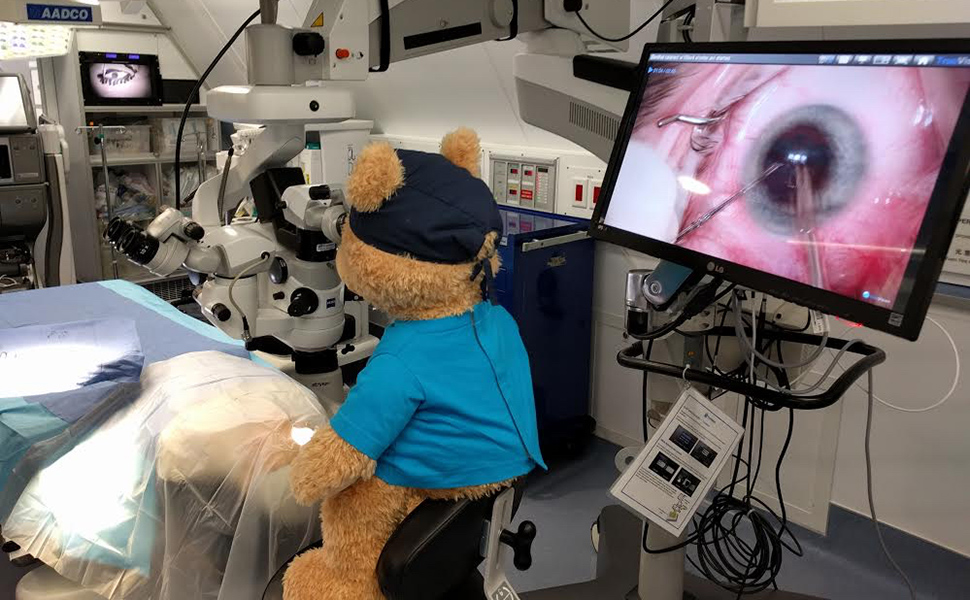
The operating room for the Flying Eye Hospital. [Photo Courtesy Orbis]
More than four decades of Alcon’s monetary and hands-on support
The Alcon Foundation has supported Orbis for more than 40 years, providing monetary donations for the Flying Eye Hospital.
Training activities in Mongolia this month will occur on the Flying Eye Hospital, currently located at Buyant-Ukhaa International Airport, and at two partner hospitals, the National Center for Maternal and Child Health and Third Central Hospital.
During the training, Orbis clinical staff and volunteer faculty medical experts will guide participants in simulation training, hands-on surgical training and patient care, and ophthalmic workshops, Alcon said. The goal is to improve local eye teams’ skills, improving the care they can provide for patients in the ophthalmic subspecialties of pediatric cataract, strabismus, and oculoplastics, and adult glaucoma, oculoplastics, and surgical retina.
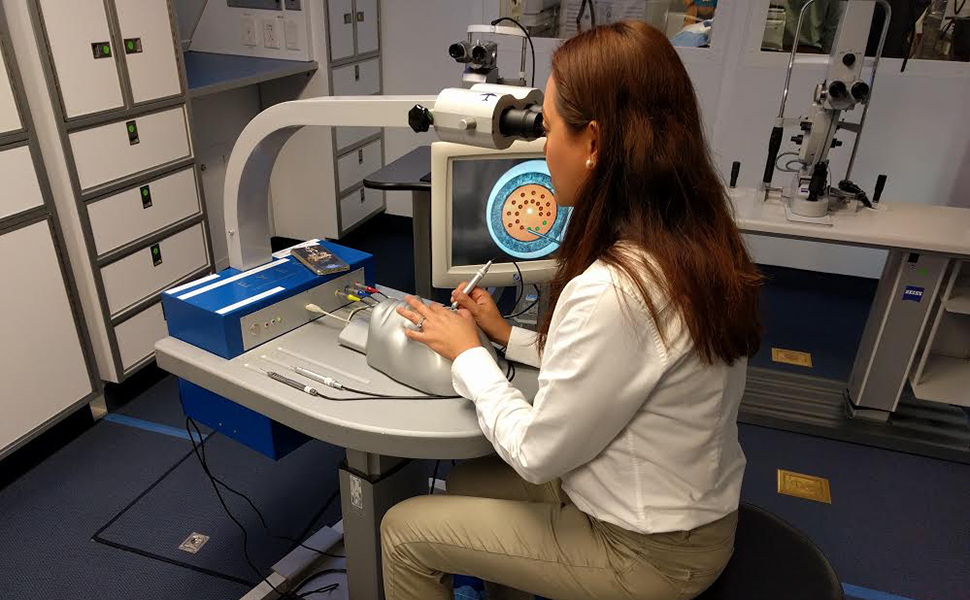
In 2016, Dr. Joanne Crosby showed how the surgical simulator works on the Flying Eye Hospital. [Photo Courtesy Orbis)
Training also will cover skills in anesthesiology, nursing, and biomedical engineering.
Alcon has provided additional support to the Flying Eye Hospital and Orbis Mongolia via donations of state-of-the-art ophthalmic equipment, surgical products, and supplies through Alcon Cares. Alcon’s expert biomedical engineers and trainers—who participate in Orbis programs, sharing their skills and knowledge to help program participants learn to operate and maintain critical medical technology—will lead a biomedical engineering workshop in Ulaanbaatar during the current project.
Most recently, Alcon supported the Flying Eye Hospital project held in Zambia in 2023.
Support from other partners
FedEx has supported Orbis in its mission for over three decades and through more than $22 million in donations and in-kind shipping. In 2021, FedEx announced its renewed commitment to Orbis’s sight-saving mission with a $3.5 million donation to help provide financial, logistical, and operational support to the organization and its Flying Eye Hospital over the following five years.
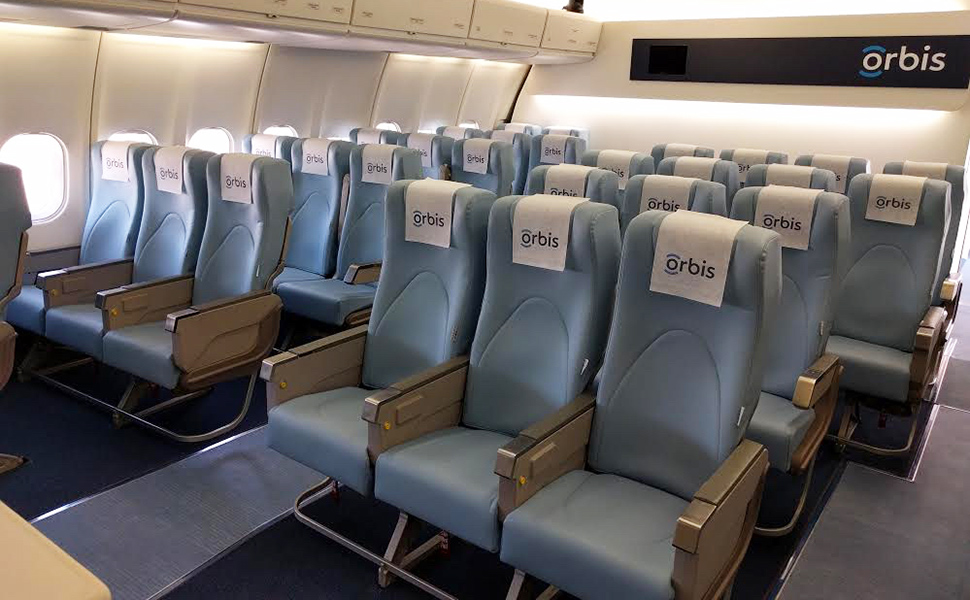
The classroom at the front of the aircraft where doctors can observe surgeries in 3-D. [Photo Courtesy Orbis]
Along with providing aircraft parts, maintenance, and pilot training, the Flying Eye Hospital is flown by FedEx pilots who volunteer their time to navigate the plane around the world to Orbis projects.
“Our commitment to Orbis’s sight-saving mission extends beyond borders. By supporting the Flying Eye Hospital, we empower local eye care teams, enhance surgical skills, and raise awareness about eye health worldwide,” Jenny Robertson, SVP, FedEx Global Brand and Communications, said in a statement.
OMEGA has been a supporter of Orbis since 2011, including its Flying Eye Hospital projects.
That includes a first-of-its-kind training project held in Doha, Qatar, in 2022 for women in eye care from conflict-affected areas and last year’s project in Zambia. OMEGA also works in cooperation with its celebrity brand ambassadors to increase awareness of Orbis and its mission.
“It’s an honor for OMEGA to support Orbis and the important work they are doing in Mongolia—and all over the world,” OMEGA President Raynald Aeschlimann said in a statement. “Since 2011, we’ve been able to witness the positive impact of their eye care and especially the lasting difference that their training can make. We commend everyone at Orbis for this latest project on board the Flying Eye Hospital.”
Pioneer in the prevention and treatment of avoidable blindness
Orbis has been working with Mongolia’s Ministry of Health for 35 years, collaborating to integrate a strong and sustainable eye care system into the national health system. Alcon said that in 2014, Orbis began a long-term program in Mongolia to further support this work.
Orbis Mongolia has also made significant advancements in training on and treatment of some of the most common conditions that lead to vision loss or blindness, including diabetic retinopathy, cataracts, glaucoma, and retinopathy of prematurity. Orbis Mongolia trains critically needed eye health professionals in refraction (assessment for glasses) and pediatric ophthalmology, expands access to quality eye care services, provides essential equipment to partners, and works with policymakers to address unmet needs.
In 2023 alone, with Orbis support, over 1,350 infants were screened for retinopathy of prematurity, and over 10,900 eye screenings and examinations were performed at community outreach events.
Orbis facilitated more than 31,800 patient visits to health facilities for eye care and trained over 940 eye care professionals last year. Nearly every ophthalmologist in Mongolia is now registered on Orbis’s telemedicine and e-learning platform, Cybersight, Alcon said.
Orbis is a global non-governmental organization that has been a pioneer in the prevention and treatment of avoidable blindness for over four decades.
As the global leader in eye care with a heritage spanning over 75 years, Alcon said it offers the broadest portfolio of products to enhance sight and improve people’s lives. Its surgical and vision care products touch the lives of more than 260 million people in over 140 countries each year living with conditions like cataracts, glaucoma, retinal diseases and refractive errors.
For more of who said what about all things North Texas, check out Every Last Word.
![]()
Get on the list.
Dallas Innovates, every day.
Sign up to keep your eye on what’s new and next in Dallas-Fort Worth, every day.




